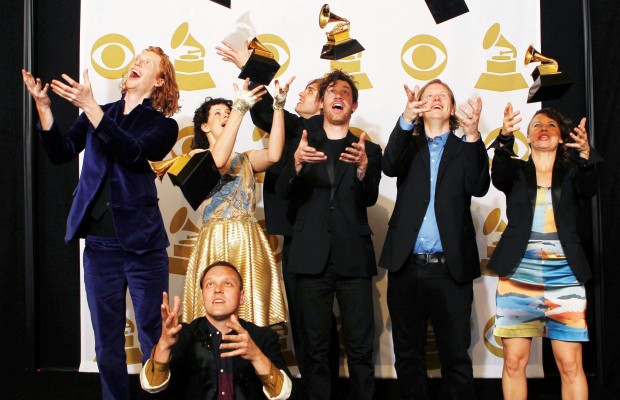In ‘indie’ we trust

Courtesy Photo / windsorstar.com Arcade Fire celebrates the win of Album of the Year by throwing their Grammys in the air
Feb 17, 2011
It is no secret that the sentiment of many consumers of media believe award shows to be self-serving and meaningless. The Gramaphone Awards (Grammys) have been one of these annual exercises in mediocrity, which present those who have spent the most time atop the Billboard Hot 100 charts with a little piece of gold on a wood stand. They cry, thank their mothers, producers, and the fans. It’s a tired routine, and frankly only applies to those who listen to an extremely narrow brand of music found on radio stations that play pop music.
There are two camps of people who watch award shows like the Grammys – those who believe the collection of performers and nominees truly reflect their listening preferences and the industry as a whole, and those who believe the awards are a great excuse to drink on a Sunday night and laugh at the absurdity of a stubborn, failing record industry patting themselves on the back. (A rogue third group may be emerging as well, those who feverishly hope that Kanye will ruin his career again.) From my perspective, there is an enormous gap between those who see the event as culturally relevant and those that find the event only slightly more engaging than waiting for a mug of oatmeal to heat up. This past Sunday, those two groups were brought closer together, for better or for worse.
If you haven’t heard of Arcade Fire, you aren’t alone. The new recipient of the questionably prestigious Album of the Year Grammy for their 2010 release The Suburbs was included on the list of nominees and performers to the confusion of many, but to the sheer celebration of others. Quietly the Montreal-via-Houston eight-piece has garnered the adoration of the indie music community, and their double album released last August was seen as their leap to the big time. Receiving near universal praise upon its release among indie pubs as well as the likes of Rolling Stone and MTV. The Suburbs is a post-hoc commentary on the pitfalls of settling down into a life devoid of expression and voice, a sentiment shared by much of the band’s young, tech-savvy, upwardly mobile fanbase. Just as Nirvana became synonymous with championing the “grunge” movement with the release of Nevermind in 1991, the Arcade Fire have now become the flagbearers of all that is “indie.”
If nobody knows about this band, why did they win? A lot of hearsay will be circling around regarding what Arcade Fire’s message truly is. Any student of media literacy could easily point out the commodification of dissent present within “The Suburbs”, and call the band out for those reasons. Any scholar of 80’s music can easily pinpoint the Blondie and Bruce Springsteen influences. But if you boil down an art form to its molecular level, you’ll find similar elements every time. As far as I’m aware, Arcade Fire didn’t make this album to specifically win a Grammy. The band still performs with an anthemic sense of bombast in order to get their message acrosd, it just so happens that with The Suburbs that message struck a chord with more people. This event needs to be identified as a true triumph for a rare band that deserves the limelight.
With any luck, this event will be instrumental in breaching the levee for indie artists beginning to receive mainstream attention. Regardless of the effect the Grammy has on a previously underground artist, many will cry foul and claim a “sell-out”. The question then will be raised among those in both camps stated earlier – does a Grammy do more to legitimize or discredit an artist? Personally, I think the cool haircuts and the guy that runs around with the drum is plenty enough legitimacy. But in all seriousness, there is one thing the music enthusiast can legitimately deduce from this year’s awards. Indie rock is coming back in a big way, and a lanky guitarist named Win and his French-Canadian wife are going to save us all.

























